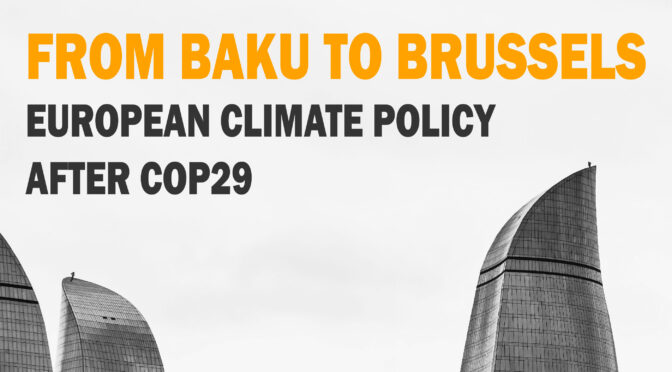
Z Baku do Brusselu:
Evropská klimatická politika po COP29
Tento kulatý stůl je organizován v rámci pravidelných setkání projektu Tandem „Contested Energy Transitions“, který vedou Martin Ďurďovič (CEFRES – Akademie věd ČR) a Gilles Lepesant (CEFRES – CNRS) za účasti Krzysztofa Tarkowského (CEFRES –Univerzita Karlova).
Datum: čtvrtek 12 prosince 2024, 9-11 h
Místo konání: CEFRES, Na Florenci 3, Prague 1
Jazyk: angličtina
Publikum: účast pouze na základě osobní pozvánky (Chatham House Rule)
V rámci semináře se zaměříme na klíčové výstupy konference COP29 a prozkoumáme přitom protichůdné postoje hlavních zúčastněných stran v oblasti klimatu a výzvy, kterým čelí evropské úsilí o dekarbonizaci. Budeme se zabývat budoucími závazky EU v oblasti klimatu a vlivem nedávných politických změn, včetně nástupu nových komisařů EU pro klima a energetiku a nedávných voleb v USA. Účastníci budou diskutovat o tom, jak tyto faktory utváří cestu EU k ambicióznímu cíli snížení emisí do roku 2040 Pokračování textu Evropská klimatická politika po COP29 →
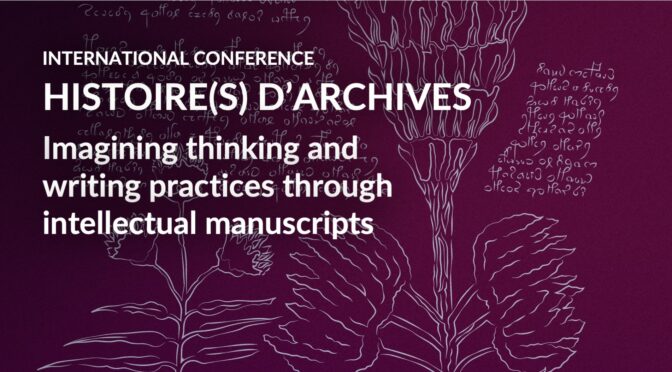
Histoire(s) d’archives: představy o praxi myšlení a psaní prostřednictvím intelektuálních rukopisů
Cílem konference je dát podnět účastníkům společně zvážit, jaké metodiky a digitální nástroje jim mohou pomoci lépe zkoumat práci autorů prostřednictvím jejich dochovaných písemností. Setkání se zároveň snaží navrhnout, jak můžeme výzkum posunout nad rámec toho, co nám tyto texty říkají. Pomocí takovéhoto přístupu by bylo možné lépe rozumět zkoumaným tvůrcům, jejich příběhům a způsobu, jak přicházeli do styku s různými kulturami. S použitím popisované metodiky bychom zároveň mohli lépe pochopit, z jakého kulturního kontextu autoři vychází, jak je ovlivnilo jejich okolí a jaké kolektivní postupy (collective practices) při psaní převládaly mezi jejich současníky. Takový náhled by nám jednak pomohl vidět dějiny idejí v novém světle, zároveň by díky němu ale mohly vzniknout snáze pochopitelné výklady o autorech a jejich dílech v digitální podobě, které by mohly být přístupné pro širší laickou veřejnost. Na konferenci se budou podílet hlávní členové výzkumné skupiny AITIA – Archives of International Theory, An Intercultural Approach.
Kdy: 5.-6. prosince 2024, od 9:30
Kde: 5. 12. CEFRES, Na Florenci 3, Praha 1
6.12 Muzeum Literatury, Pelléova 44/22, Praha 6
Současně bude probíhat online přenos
Jazyk: angličtina
Organizátoři: IRN AITIA, CNRS, CEFRES, Muzeum literatury v Praze, Archiv Jana Patočky
Program
Pokračování textu Histoire(s) d’archives →
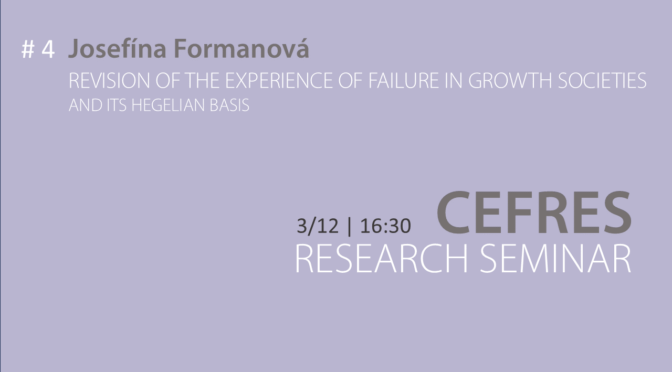
Revize zkušenosti selhání v růstové společnosti a její hegelovská východiska
Čtvrtý seminář CEFRESu
Mezioborový seminář si klade za cíl otevírat diskusi o vědeckých metodách, přístupech a konceptech. Účastníkům umožňuje vzájemně porovnávat své vědecké přístupy a seznamovat se s aktuálními tématy výzkumu napříč obory humanitních věd.
Místo: knihovna CEFRESu, Na Florenci 3, Praha 1
Datum: úterý, 3 prosinec, 2024, 4:30
Jazyk konání akce: angličtina
Registrace: cefres[@]cefres.cz
Seminář povede
Josefína Formanová (Filozofická fakulta Univerzity Karlovy v Praze)
Diskutující : Ivan LANDA (Filozofický ústav, Akademie věd)
Podkladem naší diskuse bude text:
Wiliiam DESMOND: “Philosophy and Failure” Journal of Speculative Philosophy, 1988, New Series, vol. 2. No. 4 (1988)
Abstrakt :
Pokračování textu Revize zkušenosti selhání v růstové společnosti →
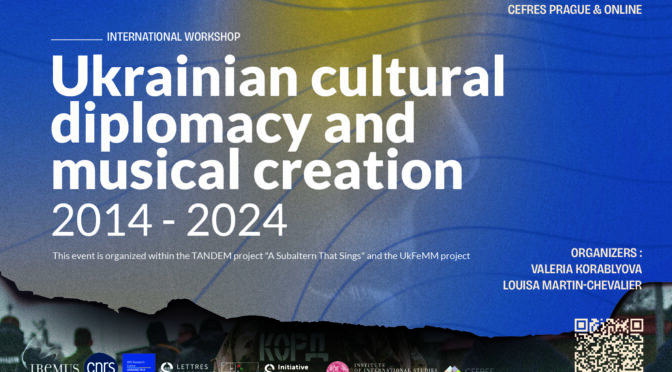
Tato konference je součástí společného výzkumného projektu TANDEM „Subalterna, která zpívá” Valerie Korablyové a Louisy Martin-Chevalier, který se věnuje hudebnímu rozměru ukrajinského odporu jako prostředku k úniku ze subalterní pozice dvojí periferie ve slepé uličce mezi EU a Ruskem.
Datum konání: 27.-29. listopadu 2024
Místo konání: CEFRES, Na Florenci 3, Praha 1
Jazyk: angličtina
Program
Pokračování textu Ukrajinská kulturní diplomacie a hudební tvorba: 2014–2024 →
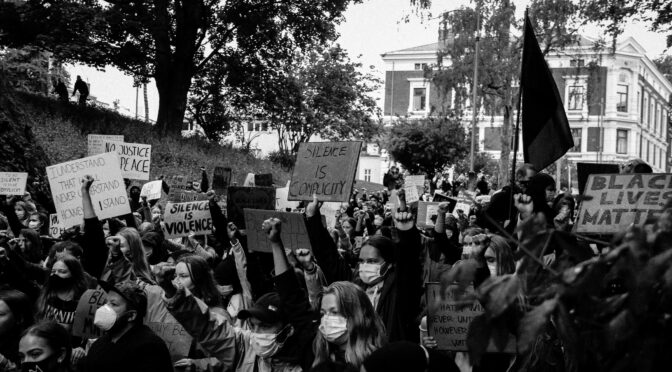
Hlas zespoda. Tváří v tvář represi
a svévolnému státnímu násilí
Třetí doktorandský workshop organizován v rámci Dohody o spolupráci mezi EHESSem a CEFRESem, Karlovou univerzitou a Akademií věd České republiky.
Datum: 22. listopadu 2024
Místo konání: CEFRES, Na Florenci 3, Prague 1 a online (odkaz k přípojení požadujte na adresu cefres@cefres.cz)
Jazyk: angličtina
Téze konference najdete zde.
Program
Pokračování textu Hlas zespoda | Workshop CEFRES-EHESS →
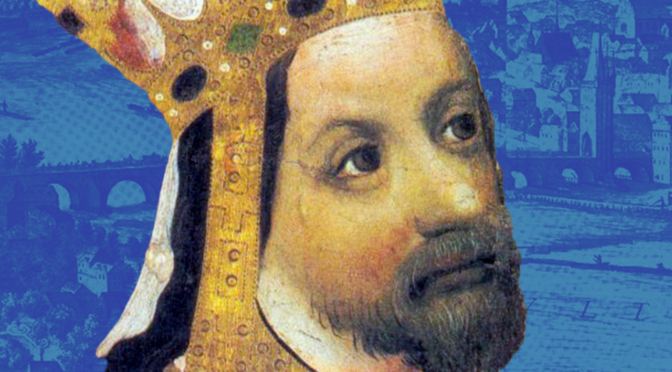
Velký rozhovor s francouzským historikem Pierrem Monnetem: Karel IV., evropský král a císař
CEFRES společně s Francouzským institutem v Praze, nakladatelstvím Karolinum a Filozofickým ústavem Akademie věd ČR mají tu čest přivítat profesora Pierra Monneta v rámci cyklu Velkých rozhovorů.
Datum: středa 20. listopadu 2024, v 18 hod
Místo konání: Francouzský institut v Praze, Štěpánská 35, Prague 1
Jazyk: rozhovor bude probíhat ve francouzštině se simultánním překladem do češtiny.
Diskusi bude moderovat historik Václav Žůrek (Centrum medievistických studií, Akademie věd ČR)
Francouzský historik představí svou knihu Karel IV.: Evropský císař, kterou v českém překladu Jany Žůrkové vydalo v roce 2023 nakladatelství Karolinum. Kniha vyšla za přispění Programu na podporu publikační činnosti F. X. Šaldy.
Abstrakt
Pokračování textu Velký rozhovor s Pierrem Monnetem o Karlu IV. →






